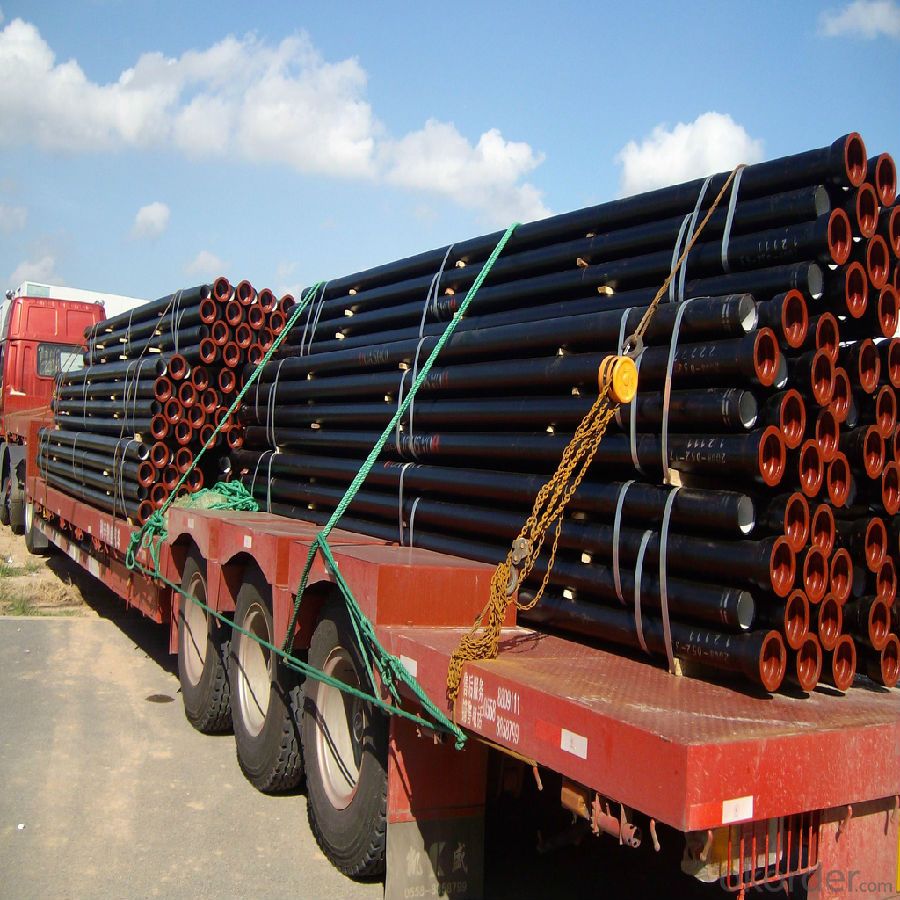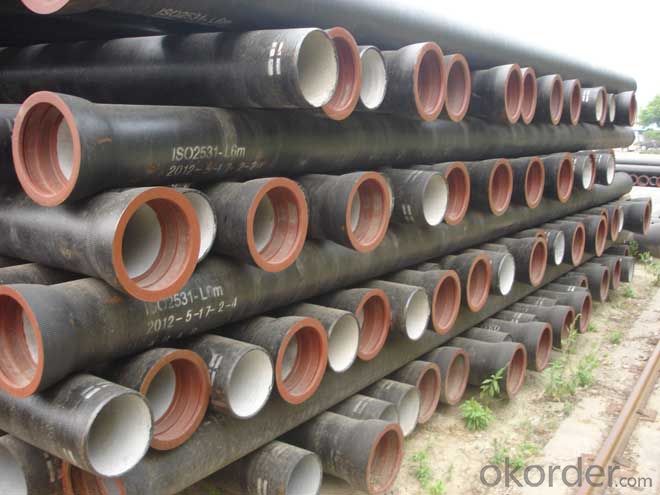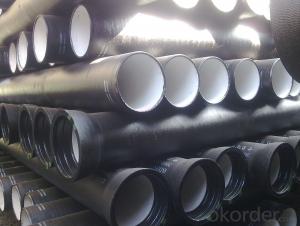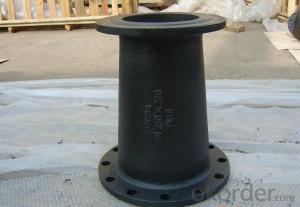Ductile Iron Pipe and Fitting DN100-800 Class30 EN545
- Loading Port:
- China main port
- Payment Terms:
- TT or LC
- Min Order Qty:
- 20 m.t.
- Supply Capability:
- 200000 m.t./month
OKorder Service Pledge
OKorder Financial Service
You Might Also Like
1,Ductile Iron Pipe Description :
1) Pipes confirm to ISO2531,K9 class,T type joint,6m long,with inside cements lining conform to ISO4179, outside Zinc spraying(130g/m2) and bitumen coating(70μm) conform to ISO8179.
2) Pipe ends: Spigot and socket ends, with 100% SBR rubber gaskets accoding to ISO4633
3) we can do third party inspection according to customer's request.
2,Main Features of the Ductile Iron Pipe:
1. Material: Ductile iron grade 500-7/ 450-10 in accordance with ISO1083
2. Standard: ISO 2531, EN545, EN598, ANSI, AWWA
3. Certificate: ISO9001, ISO14001, SGS, NSF, WRAS
4. Test: In accordance with ISO 2531 / EN 545 / EN598 and 100% water pressure test
5. Length: 6m or cut into 5.6m, 5.7m, 5.8m
6. Internal Lining: Cement, conform to ISO4179
7. Rubber: NBR, SBR, EPDM according to ISO4633 / EN681.1
3,Ductile Iron Pipe Images:


4.Ductile Iron Pipe Specification:
Internal lining: ductile iron pipes shall have an internal cement mortar lining in acc with ISO4179.
External coating: ductile iron pipes shall be externally coated with metallic zinc spray plus a further layer of resin painting to ISO8179.
Gasket: 100% SBR/NBR/EPDM rubber gasket in accordance with ISO4633.
Packing: ductile iron pipes from DN100 to DN300 be bundled with steel belts, others are in bulk.
Payment term: L/C, T/T.
5.FAQ:
We have organized several common questions for our clients,may help you sincerely:
1.Q:Why can you guarantee the inner of pipes can’t be corroded?
A: High alumina cement mortar lining and sulphate-resistant cement mortar lining. These two special linings are applicable to inner anti-corrosion for sewage pipes, improving resistance to erosion of the sewage components.
2.Q: Why would you choose ductile iron pipe rather than other pipe materials?
A:The reasons are obvious for that not only ductile iron pipe possesses the inherent strength and flexibility of ductile iron, combined with proven corrosion protection systems, but also the cost savings can be achieved from design to installation and commissioning.
- Q:Are ductile iron pipes resistant to microbiologically induced corrosion?
- Yes, ductile iron pipes are generally resistant to microbiologically induced corrosion (MIC). Ductile iron is a type of cast iron that has been treated with magnesium to give it increased strength and flexibility. This treatment creates a protective layer on the surface of the iron, making it less susceptible to corrosion caused by microorganisms. MIC occurs when certain types of bacteria, fungi, or other microorganisms interact with the metal surface of pipes and produce corrosive byproducts. However, ductile iron is generally resistant to MIC because the protective layer formed during the manufacturing process acts as a barrier, preventing microorganisms from directly contacting the metal surface. Additionally, ductile iron pipes are often lined with cement mortar or other protective coatings, which further enhance their resistance to corrosion. These linings provide an additional layer of protection against microorganisms, reducing the potential for MIC. Despite these inherent resistance properties, it is important to note that the resistance to MIC can vary depending on the specific conditions and environment in which the pipes are installed. Factors such as water quality, temperature, and the presence of certain microorganisms can influence the susceptibility of ductile iron pipes to MIC. Therefore, it is essential to consider these factors and take appropriate measures to prevent MIC, such as regular monitoring of water quality, proper maintenance, and the use of corrosion inhibitors or biocides when necessary.
- Q:Can ductile iron pipes be used in areas with high levels of organic matter in soil?
- Yes, ductile iron pipes can be used in areas with high levels of organic matter in soil. Ductile iron pipes have excellent corrosion resistance, making them suitable for various soil conditions, including those with high levels of organic matter. They are resistant to chemical attacks and offer long-term durability, making them a reliable choice for such environments.
- Q:Can ductile iron be welded? Is weldability comparable to gray iron?
- Suitable for the full range of cold welding welding, welding cast iron base material can almost all, and it is easy to achieve cast iron and carbon steel dissimilar metal welding, such as solving matrix fracture, crack, wear, hole filling defects after welding can be machined, many applications in the engine casing, cylinder head, casting machine, gear base the tooth of iron castings.
- Q:What are the common methods for leak detection in ductile iron pipes?
- Professionals in the field commonly utilize various techniques to detect and locate leaks in ductile iron pipes. These methods play a crucial role in timely leak identification. 1. Acoustic Leak Detection: By employing specialized equipment, professionals listen for the sound of water escaping from the pipe. This equipment detects the leak's sound and aids in pinpointing its exact location. This technique is effective for both pressurized and non-pressurized pipes. 2. Visual Inspection: Physically inspecting the pipe system for visible signs of leaks, such as water stains, wet spots, or puddles, constitutes visual inspection. This relatively straightforward method proves effective in detecting visible leaks in accessible areas. 3. Pressure Testing: During installation or maintenance, pressure testing involves pressurizing the pipe system and monitoring pressure drops. A decrease in pressure signifies the presence of a leak. This method is particularly useful for identifying leaks in inaccessible areas. 4. Infrared Thermography: Infrared cameras detect leaks by measuring temperature variations. The camera can identify temperature differences caused by water escaping from a pipe. This technique is especially efficient in identifying concealed leaks behind walls or underground. 5. Tracer Gas Testing: Tracer gas testing entails injecting a specific gas, such as helium or hydrogen, into the pipe system. In the event of a leak, the gas escapes and can be detected using specialized equipment. This highly sensitive method can locate even minute leaks. 6. Soil Gas Monitoring: Monitoring the soil surrounding the pipe allows professionals to detect gases emitted by leaking water. Analyzing the composition of the soil gas aids in determining the leak's location. It is essential to consider the specific circumstances, such as pipe system size, accessibility, and leak severity when selecting a method. Combining multiple techniques may be necessary to ensure accurate and comprehensive leak detection.
- Q:Are ductile iron pipes suitable for underground storage tanks?
- Ductile iron pipes are indeed suitable for underground storage tanks. Ductile iron is a strong and durable material that is highly resistant to corrosion and can withstand the pressure and weight of being buried underground. These pipes are widely used in various underground applications, including water and sewage systems, as they have excellent tensile strength and can handle both internal and external loads. Moreover, ductile iron pipes have a long service life, often exceeding 100 years, making them a reliable choice for underground storage tanks. They are also resistant to ground movement and can adapt to soil settling or shifting, ensuring the integrity and stability of the storage tank system. Additionally, ductile iron pipes provide excellent flow characteristics due to their smooth internal surface, preventing the accumulation of debris or sediment that could potentially clog the system. This makes them an ideal choice for storing various liquids or substances. Overall, the strength, durability, corrosion resistance, and long service life of ductile iron pipes make them a suitable and reliable option for underground storage tanks.
- Q:Are ductile iron pipes resistant to external loads?
- Yes, ductile iron pipes are generally resistant to external loads. Ductile iron is a type of cast iron that has been treated with additives such as magnesium and cerium to make it more flexible and durable. This increased flexibility allows the pipes to withstand high levels of external pressure and stress without cracking or breaking. Ductile iron pipes are commonly used in applications where they are exposed to heavy loads, such as underground water distribution systems, sewer lines, and industrial pipelines. These pipes have been proven to have excellent resistance to external loads, making them a reliable choice for various infrastructure projects.
- Q:What is the expected noise reduction of ductile iron pipes?
- Several factors can influence the expected noise reduction of ductile iron pipes. These factors include the characteristics of the pipe material and design, the installation method, and the surrounding environment. Generally, ductile iron pipes have been found to offer significant noise reduction compared to other pipe materials. Ductile iron pipes are renowned for their superior acoustic performance, thanks to their dense and robust construction. The material's high density helps absorb and dampen noise vibrations, thus reducing the transmission of sound waves through the pipe. Furthermore, the smooth internal surface of ductile iron pipes minimizes turbulence and friction, contributing further to noise reduction. Numerous studies and field tests have demonstrated that ductile iron pipes can achieve noise reductions ranging from 10 to 20 decibels (dB) or even higher, depending on specific conditions. These noise reductions can greatly enhance the acoustic environment in areas where the pipes are used, such as residential areas, hospitals, or schools. It is important to acknowledge that while ductile iron pipes can provide substantial noise reduction, other factors like pipe connections, fittings, and valves can impact the overall acoustic performance. Proper installation techniques, including the utilization of effective seals and dampers, can further enhance noise reduction. In conclusion, ductile iron pipes are expected to offer significant noise reduction benefits due to their dense construction, smooth internal surface, and efficient installation methods. However, it is crucial to consider the specific requirements of each project and consult professionals to determine the anticipated noise reduction levels based on the particular circumstances.
- Q:Do ductile iron pipes require external protection against stray electrical currents?
- Ductile iron pipes indeed necessitate external safeguarding against stray electrical currents. The presence of such currents can induce corrosion in the pipes, resulting in premature failure and probable leakage. To counteract this, protective coatings or wraps are employed on the ductile iron pipes, creating a shield between the pipes and the electrical currents. This safeguarding measure guarantees the durability and dependability of the pipes, warding off expensive repairs and potential safety risks.
- Q:What are the specifications for the installation of water ball iron pipes?
- Groove support: according to the groove soil, groundwater, slotted cross section, load conditions and other factors, the design requirements are firm and reliable, to prevent landslides, support, shall not impede the lower pipe and stable pipe.
- Q:What's the difference between grey cast iron pipe and ductile iron pipe?
- Ductile iron pipe is a kind of casting alloy developed in the late 1940s. It is a kind of spheroidal graphite cast iron which is added into the molten iron by adding inoculant and inoculant. The mechanical properties of spherical graphite, so much more better than that of grey cast iron, cast iron, close to the steel, but the price is lower than steel, and still has many excellent properties of ordinary cast iron, such as good casting, shock absorption, machinability and low notch sensitivity etc.. Therefore, many important mechanical parts, such as crankshaft, connecting rod, gear, valve body and cylinder liner, can be made of ductile iron to save steel and reduce cost.
1. Manufacturer Overview |
|
|---|---|
| Location | |
| Year Established | |
| Annual Output Value | |
| Main Markets | |
| Company Certifications | |
2. Manufacturer Certificates |
|
|---|---|
| a) Certification Name | |
| Range | |
| Reference | |
| Validity Period | |
3. Manufacturer Capability |
|
|---|---|
| a)Trade Capacity | |
| Nearest Port | |
| Export Percentage | |
| No.of Employees in Trade Department | |
| Language Spoken: | |
| b)Factory Information | |
| Factory Size: | |
| No. of Production Lines | |
| Contract Manufacturing | |
| Product Price Range | |
Send your message to us
Ductile Iron Pipe and Fitting DN100-800 Class30 EN545
- Loading Port:
- China main port
- Payment Terms:
- TT or LC
- Min Order Qty:
- 20 m.t.
- Supply Capability:
- 200000 m.t./month
OKorder Service Pledge
OKorder Financial Service
Similar products
New products
Hot products
Hot Searches
Related keywords


























